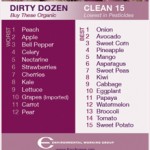New Healthy Living Section on our Site
We know that the long-list of hazardous chemicals and products out there is overwhelming. Sometimes it feels like no matter how much you educate yourself, a new report emerges with evidence of another carcinogen, another endocrine disruptor.
So what should you do if you’re trying to keep your family safe but don’t have time to conduct your own research? Check out the HEALTHY LIVING section of our site, where you’ll find quick facts on environmental toxins and how to stay safe. We cover everything from Cosmetics to Cleaning Products and some in between. You can even print them out to keep on you while you shop.





